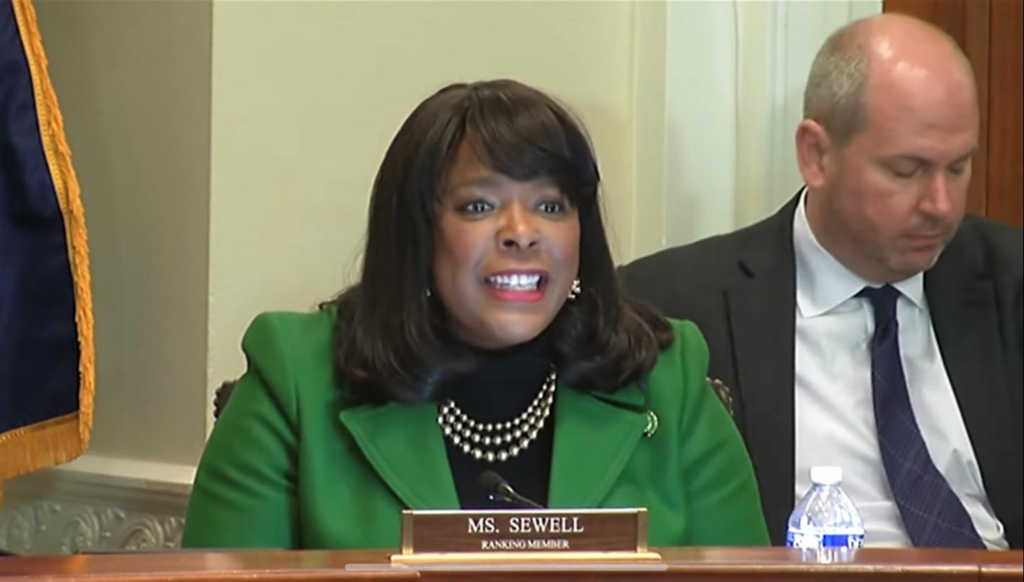Rep. Terri Sewell celebrates Judge U.W. Clemons on his 80th birthday

On Tuesday, Congresswoman Terri Sewell celebrated the birthday of the Honorable Judge U.W. Clemon with a speech on the floor of the U.S. House of Representatives. Clemon was Alabama’s first Black federal judge. He was also a former State Senator. He celebrated his 80th birthday on Sunday, April 9th. “I rise today to honor the extraordinary career of a legal giant and Civil Rights activist, Alabama’s first Black federal judge, the Honorable U.W. Clemon, who celebrated his 80th birthday on April 9th,” Sewell said on the floor of the House. “A native of Alabama, Judge Clemon was born in 1943. Despite much of his childhood in the segregated school system of Jefferson County, Clemon broke down barriers, graduating as a two-time valedictorian, first at Westfield High School in 1961 and then at Miles College in 1965. As a college student, Judge Clemon was a leading voice for civil rights. He marched in countless student demonstrations under the direction of Dr. (Martin Luther) King and played a pivotal role in the Selective Buying Campaign to boycott segregated stores in downtown Birmingham.” “Before graduating from Columbia Law School in 1968, Clemon clerked at the NAACP Legal Defense Fund, forming a life-long association serving as local counsel on numerous civil rights lawsuits throughout Alabama,” said Sewell. “Judge Clemon always understood the importance of the law in the fight for justice and equality. He quickly gained a reputation as an effective and fearless lawyer, taking on Coach “Bear” Bryant to desegregate the all-white University of Alabama football team, and he took on the U.S. Steel Corporation, which led to the desegregation of the American steel industry.” “By 1974, Judge Clemon took his advocacy to the Alabama State Legislature, making history as one of the first two African Americans elected to the Alabama Senate since Reconstruction,” Sewell said. “His tenure as a pioneering lawmaker and skilled attorney caught the attention of President Jimmy Carter, who appointed then-(Alabama State) Senator Clemon to serve as Alabama’s first Black federal judge in 1980. He went on to serve on the federal bench for 30 years until 2009.” “Judge Clemon was a highly respected jurist inside and outside the courtroom,” Sewell continued. “He was known as fair but tough. He demanded that lawyers before him represent their clients competently and effectively. Judge Clemon served as Chief Justice for the United States District Court for the Northern District of Alabama from 1999 to 2006.” “Despite retiring from the bench in 2009, Judge Clemon has remained a vibrant member of the Birmingham legal community where he continues to practice law, serving the underrepresented, vulnerable, and underserved,” said Sewell. “He has received numerous awards, holds three honorary degrees, two street namings, and most recently, an elementary school was named in his honor. On a personal note, Judge Clemon is a trusted advisor, counselor, and a loving father figure to me. My most formative legal experience was serving as a law clerk for Judge Clemon after graduating from law school in 1992.” “I learned so much serving as his law clerk,” said Sewell. “I learned more about the practice of law and saw firsthand what justice looks like by witnessing him in his courtroom. Sitting with him in his chamber was always an educational experience. The Judge tested my knowledge, stretched my legal acumen, challenged my views, and inspired me to be a better lawyer and person. I know that I now serve as Alabama’s first Black Congresswoman because I was blessed by a transformative experience clerking for Alabama’s first Black federal judge. I want to thank his loving family, his wife of 50 years, Ms. Barbra, and his two children, Michelle and Isaac, for sharing him with so many of us.” “I ask my colleagues to join me in celebrating the 80th birthday and the extraordinary career of an exceptional jurist, lawmaker, and public servant, and wonderful counselor, Judge U.W. Clemon, whose life’s work stands as a testament to the power of one person to change the world,” said Sewell. “May the seeds Judge Clemon has sowed continue to bear fruit for generations to come. Happy birthday, Judge.” During U.W. Clemon’s tenure in the Alabama Senate, he chaired the Senate Rules Committee and the Senate Judiciary Committee. Terri Sewell is the first Black Woman to represent Alabama in the U.S. House of Representatives. She is serving in her seventh term representing Alabama’s Seventh Congressional District. To connect with the author of this story or to comment, email brandonmreporter@gmail.com
Legislature to convene Tuesday for fourth week of the session

Both Houses of the Alabama Legislature will meet on Tuesday for the eleventh day of the 2023 Alabama Regular Legislative Session. The Alabama Senate will convene at 2:30 p.m. The Alabama House of Representatives has not posted the start time on the Legislature’s website, but it is probably around 1:00 p.m. The House Tuscaloosa County Legislation Committee will meet Tuesday at 12:45 p.m. in Room 418 of the Statehouse. The committee will consider just one bill. House Bill 275 (HB275) is sponsored by State Representative Ron Bolton. According to the bill, “it would allow the City of Northport in Tuscaloosa County to provide for a warrant recall fee to allow a municipal judge or municipal magistrate for the City of Northport to recall, under certain conditions, a failure to appear warrant.” The Senate County and Municipal Government Committee will meet at 1:00 p.m. in the Senate Finance and Taxation room on the eighth floor of the Alabama Statehouse. Two bills are on the agenda. There is a public hearing scheduled for House Bill 114. HB114 is sponsored by State Representative Debbie Wood. HB114 will allow county governments to claim unclaimed property in their custody faster. Senator Gerald Allen sponsors Senate Bill 169. SB169 would specify that for municipal business taxes purposes, the definition of gross receipts does not include any excise tax imposed by the federal, state, and local governments. Senate Bill 203 (SB203) had been on an earlier version of the Committee agenda but was removed as of press time. SB203 is sponsored by Sen. Jabo Waggoner. SB203 would “authorize any county, municipality, or governmental entity subject to a countywide civil service system to elect by a majority vote of the county or municipal governing body to opt out of the countywide civil service system; to require the county, municipality, or governmental entity to adopt a human resources policy and procedures manual; and to require the county, municipality, or governmental entity to notify the director of the countywide civil service system of its decision to withdraw from the system.” There are over a dozen committee meetings scheduled for Wednesday. Neither the House of Representatives nor the Senate have released a special order calendar as of press time. State Rep. Susan Dubose reported that her legislation (House Bill 261) will be on the House floor on Tuesday. HB261 protects female college athletes from having to compete with biological males in athletics events. The transgender community will likely oppose the bill. It has 39 Republican cosponsors. The regular session is limited by the Alabama Constitution of 1901 to no more than thirty legislative days in a regular session. Tuesday will be the 11th Legislative day. To connect with the author of this story or to comment, email brandonmreporter@gmail.com.
Senate committee advances education reform legislation

On Wednesday, the Alabama Senate Education Policy Committee advanced legislation with several educational goals – including requiring that future Alabama High School seniors must meet at least one college or career-ready benchmark to graduate. House Bill 109 (HB109) is sponsored by State Representative Terri Collins. Collins explained that HB109 is omnibus legislation that includes three acts: the Alabama Credential Quality and Transparency Act, the Alabama Terminal on Linking and Analyzing Statistics on Career Pathways Act, and the Alabama College and Career Readiness Act. “They are based on the recommendations of the Alabama Workforce Task Force,” Collins told the Committee. The Career Pathways Act would let students see what the high demand job in their area are and what it takes to get those jobs,” Collins explained. “And hopefully grow our labor participation rate.” Collins explained that students must complete at least one benchmark for college or career-ready standards. To prove college readiness, that could be a high score on the ACT, completing an advanced placement course, or completing a dual enrollment course. For military readiness, the benchmark could be taking the ASVAB test. Career readiness could be completing an apprenticeship, receiving a skills credential, or completing other skills training. Collins said, “In order to graduate in 2025, you would either have to be college ready or be career ready.” State Senator Donnie Chesteen is the chair of the Education Police Committee. Chesteen said there was a committee amendment to the bill. Collins said, “The original bill said that the college and career-ready part of this had to be in place by 2024-2025. The amendment puts that back to 2025-2026.” Chesteen said, “Moving the start date back to 2026 is important for those who may have slipped through the cracks. Thank you for working with us on this amendment.” Sen. Rodger Smitherman said, “I like this bill. I was an orderly. We don’t have orderlies now – we have LPNs. The advantage was that I was career-ready when I graduated from high school. I was working while in high school.” To make it easier for employers and workers to navigate the increasingly complex system of credentials needed to apply for positions in the 21st-century economy, the bill creates a free searchable public online registry of educational and occupational credentials. The act includes restrictions on releasing personally identifiable information, including procedures for handling data breaches. The Committee voted to give HB109 a favorable report on an 8 to 0 vote. The full Senate could consider the amended bill as early as Tuesday. Tuesday will be day 11 of the regular session. The Legislature is limited by the Alabama Constitution to no more than thirty legislative days during a regular session. To connect with the author of this story or to comment, email brandonmreporter@gmail.com.
Legislature passes DRAM shop reform legislation

On Tuesday, April 11, the Alabama Legislature passed legislation that sponsors hope will lower insurance costs for bars and restaurants serving alcohol. Senate Bill 104 (SB104) was sponsored by State Senator Chris Elliott. It had 15 Republican cosponsors in the Senate, including Majority Leader Clay Scofield. SB104 was carried in the Alabama House of Representatives by State Representative David Faulkner. Under current law, if a person becomes intoxicated at a bar, nightclub, or restaurant that serves alcohol and then is involved in an accident afterward, Alabama has a “strict liability” in place where the owner of the establishment that served the alcohol can be held civilly liable for that accident by the persons harmed or killed by the intoxicated person. This is the strongest standard under the law in the nation. Because of this high liability standard, only three insurers are willing to sell liability insurance in Alabama. This insurance is called DRAM shop coverage. The law requires that coverage as a condition of having a liquor license, but the required $100,000 coverage can cost as much as $35,000. One insurance carrier has threatened to pull out of college towns, including Auburn and Tuscaloosa. SB104 replaces that strict liability standard in the law with a new standard that lessens the liability on the owners of bars, nightclubs, and restaurants. SB104 creates a standard under which a server would have to knowingly serve a visibly intoxicated person, and for that service to be the proximate cause of an injury or death for the business to be liable. This legislation is being passed at the urging of the hospitality, insurance, retail, and tourism industries. 11 trade associations came together to press for this legislation. That alliance includes the: Alabama Beverage Licensees Association, Alabama Brewers Guild, Alabama Grocers Association, Alabama Independent Insurance Agents, Alabama Restaurant and Hospitality Association, Alabama Retail Association, Alabama Tourism Partnership, Business Council of Alabama (BCA), Gulf United Metro Business Organization (GUMBO), National Federation of Independent Businesses, and the Petroleum and Convenience Marketers of Alabama. Dothan Attorney Pamela Halford said, “In Alabama, if you have served alcohol to a person who later becomes intoxicated and causes damages, you are responsible for those damages whether or not the person was intoxicated at the time of sale or not. This is a strict liability scheme and resulted in only three insurance carriers willing to write liability insurance coverage for liquor liability. Obviously, this is problematic for those in the retail and hospitality industry. Accordingly, several organizations got together and lobbied for what passed yesterday – which was Senate Bill 104, which removes the strict liability scheme and instead requires knowingly to someone who is visibly intoxicated before you can be responsible for any resultant damages. This removes the strict liability scheme and hopefully make it easier for you to get liquor liability insurance in the State of Alabama.” House Bill 158 was the companion bill introduced in the House. SB104 passed the House of Representatives 104 to 0. It has already passed the Senate and will head to the Governor’s desk for her signature. Tuesday will be day 11 of the 2023 Alabama Regular Legislative Session. To connect with the author of this story or to comment, email brandonmreporter@gmail.com.
GOP leader Mitch McConnell returns to Senate after head injury

Senate Republican leader Mitch McConnell is back at work in the U.S. Capitol on Monday, almost six weeks after a fall at a Washington-area hotel and extended treatment for a concussion. The longtime Kentucky senator, 81, has been recovering at home since he was released from a rehabilitation facility March 25. He fell after attending an event earlier that month, injuring his head and fracturing a rib. McConnell arrived at the Capitol early Monday and is expected to work a full schedule in the Senate this week. In brief remarks on the Senate floor, as the chamber came back into session after a two-week recess, McConnell criticized President Joe Biden for not doing enough to negotiate on the nation’s debt ceiling and thanked his colleagues for their well-wishes. “I’m very happy to be back,” McConnell said. “There’s important business for Congress to tackle.” And he joked, “Suffice it to say, this wasn’t the first time that being hard-headed has served me very well.” McConnell returns to the Senate ahead of a busy stretch in which Congress will have to find a way to raise the debt ceiling and negotiate additional aid for the Ukraine war, among other policy matters. And he comes back as several other senators have been out for medical reasons, raising questions about how much the Senate will be able to achieve in the coming months with a 51-49 split between the parties. Already, the GOP leader’s absence, along with those of Democratic Sens. Dianne Feinstein and John Fetterman, among others, have added to the Senate’s lethargic pace in the first few months of the year. Unlike the last two years, in which Senate Majority Leader Chuck Schumer was able to push through key elements of President Joe Biden’s agenda with the help of a Democratic-led House, the Senate has been significantly slowed with Republicans now in charge in the House. And absences have made even simple votes like nominations more difficult. One immediate question for McConnell upon his return is whether to help Democrats temporarily replace Feinstein on the Senate Judiciary Committee as she continues to recover in California from a case of the shingles. Democrats have become increasingly frustrated as the Democrat’s more than six-week absence on the panel has stalled confirmation of some of Biden’s nominees, and Feinstein has asked for a short-term substitute on the committee. Democrats can’t do that, though, without help from Republicans, since approval of the process would take 60 votes on the Senate floor. Two GOP members of the Judiciary panel, Sens. Tom Cotton of Arkansas and Marsha Blackburn of Tennessee, have already said they don’t believe that Republicans should help Democrats replace Feinstein. It is unclear when Feinstein, 89, will return to Washington. Her office has so far declined to say. Also returning to the Senate on Monday was Fetterman, who was hospitalized for clinical depression in February. He was treated for six weeks at Walter Reed National Military Medical Center, and his doctors say his depression is now “in remission.” Fetterman’s announcement that he was checking himself into the hospital earlier this year came after he suffered a stroke last year and has struggled with auditory processing disorder, which can render someone unable to speak fluidly and quickly process spoken conversation into meaning. The Pennsylvania Democrat, 53, now uses devices in conversations, meetings and congressional hearings that transcribe spoken words in real time. In a statement when he was released from Walter Reed late last month, Fetterman said the care he received there “changed my life.” “I’m excited to be the father and husband I want to be, and the senator Pennsylvania deserves,” said Fetterman, who won praise for his decision to seek treatment. McConnell visited his Capitol office on Friday ahead of his Monday return. In video captured by NBC News, he walked into the building without assistance as aides kept close by. This was the second major injury for McConnell in recent years. Four years ago, he tripped and fell at his home in Kentucky, causing a shoulder fracture that required surgery. The Senate had just started a summer recess, and he worked from home for some weeks as he recovered. McConnell had polio in his early childhood, and he has long acknowledged some difficulty as an adult in climbing stairs. Republished with the permission of The Associated Press.
Alabama’s grocery tax could be eliminated in this year’s session

Alabama is one of three remaining states that tax groceries, but if advocates have their way, the state could soon get rid of the levy in this year’s legislative session. State Sen. Merika Coleman, D-Pleasant Grove, wants to eliminate the state’s 4% tax on groceries and replace that income by ending the state’s state income tax deduction for federal income tax. “We call this the FIT, or FIT deduction, and it should give you a fit,” Coleman said in a release. “You should have a fit, because it’s an unfair tax break that disproportionately lowers taxes for the wealthiest people.” Alabama Arise, a nonprofit group that works to help those “marginalized by poverty,” says that any grocery tax reduction should allow for Supplemental Nutritional Assistance Program-eligible foods (rather than only foods eligible under the Special Supplemental Nutrition Program for Women, Infants, and Children program) to be untaxed. The organization says doing so would increase the number of untaxed items, prevent confusion and reduce the difficulty of implementation for retailers. “We’re here today to ask our lawmakers to end the state grocery tax quickly and responsibly,” Alabama Arise Action board president Kathy Vincent said in a release. “This is the year to finally untax groceries once and for all.” Not everyone supports the grocery tax elimination. The nonpartisan Tax Foundation argues that a complete rate reduction of income or sales taxes, along with a targeted grocery tax credit, would be a better solution. Alabama is one of three states, along with Mississippi and South Dakota, to levy a tax on groceries. Alabama’s combined sales tax averages 9.25%, the fourth highest nationally, according to the Tax Foundation. In Alabama’s largest cities, such as Birmingham, Huntsville, Mobile, and Montgomery, the tax rate is 10% when local taxes are combined with the state’s 4% levy. “Exempting groceries from the sales tax base reduces economic efficiency without achieving its objective of enhancing tax progressivity,” said Janelle Fritts, policy analyst for the Tax Foundation. “If the goal of exempting groceries is to lower tax burdens for all residents of a state, reducing sales or income taxes across the board would better accomplish this goal, and if the goal is to help those with lower incomes, targeted grocery tax credits would do more good than a grocery tax exemption for everyone.” Research by the Tax Foundation found that the poorest households experience 9% more sales tax liability with a grocery tax exemption than if groceries were taxed and the overall sales tax rate was reduced. According to the study, low-income households spend more on groceries as a share of income and that explains the increased sales tax liability. Republished with the permission of The Center Square.
State prosecutors ask Supreme Court to protect veterans’ rights

Virginia Attorney General Jason Miyares is leading a bipartisan group of attorneys general from 33 states and the District of Columbia in asking the U.S. Supreme Court to hear the case of a veteran denied certain educational benefits through the Department of Veterans Affairs. Miyares and the coalition of attorneys general assert Virginia resident and decorated Army veteran Jason Rudisill was wrongly denied his Post 9/11 GI Bill benefits. After completing his first tour of duty, Rudisill, as an enlisted soldier, utilized his Montgomery GI Bill benefits to complete his undergraduate degree. “[Rudisill] was twice honorably discharged, and relied on approximately 25 months of education benefits under the Montgomery GI Bill before November 2007 to obtain his undergraduate degree. He then reenlisted, was commissioned as an officer, and served a third tour from 2007 to 2011,” according to the brief filed by the state prosecutors. After completing his third tour of duty, Rudisill was accepted into Yale Divinity School with hopes of returning to the armed forces as a chaplain. Rudisill attempted to use his Post-9/11 GI Bill benefits, but the VA denied his request. The VA defended its decision by saying Rudisill was not entitled to use both the Montgomery GI Bill and the Post 9/11 GI Bill. The VA specifies veterans’ preference in deciding which GI Bill they opt to utilize, “If you’re eligible for more than one education benefit, such as the Post-9/11 GI Bill and the Montgomery GI Bill, you must choose which benefit to receive.” Advocates for Rudisill argue veterans with “multiple requisite periods of service” are entitled up to 48 months of educational benefits. During Rudisill’s third tour of duty Congress passed the Post 9/11 GI Bill. “He applied for Post-9/11 GI Bill benefits based on his understanding that, under the Bill, he had approximately 22 months of education benefits remaining out of his 48 aggregate months,” the brief explained. The VA determined Rudisill’s Post-9/11 benefits would be limited to 10 months and 16 days, “because [Rudisill] had used some of his entitled benefits under the prior version of the GI Bill.” The Montgomery GI Bill and the Post-9/11 GI Bill entitle eligible veterans to receive up to 36 months of tuition payouts. The Montgomery GI Bill offers up to a set monthly amount, which is sent directly to the student. The Post-9/11 GI Bill pays the tuition to the school. Under the Post-9/11 GI Bill, students are eligible for housing or book stipends, which is not included under the Montgomery GI Bill. The coalition of attorneys general contends hundreds of thousands of veterans’ “rights” are in “jeopardy” by the Federal Circuit’s decision and are requesting the Supreme Court “secure” those rights by striking the lower court’s decision. The state prosecutors say the decision made by the U.S. Court of Appeal for the Federal Circuit to uphold the VA’s decision in the case of Rudisill v. McDonough, could negatively impact post-9/11 veterans. “The Federal Circuit took away both Rudisill and thousands of other post-9/11 veterans’ GI education benefits,” said Miyares. “This decision actively hurts veterans’ reentry into civilian life and deprives them of earned benefits.” Miyares is concerned the decision will negatively impact veterans as they transition out of the military. “Over 700,000 veterans live in the Commonwealth of Virginia. This decision actively hurts veterans’ reentry into civilian life and deprives them of earned benefits,” Miyares said. The Center Square reached out to the VA for comment; it had yet to respond at the time of publication. State prosecutors joining Miyares are from Alabama, Arizona, Arkansas, California, Colorado, Connecticut, Delaware, Georgia, Idaho, Illinois, Iowa, Kentucky, Louisiana, Massachusetts, Minnesota, Mississippi, Montana, New Jersey, New Mexico, New York, Oklahoma, Oregon, Rhode Island, South Carolina, South Dakota, Texas, Utah, Vermont, Washington, West Virginia, Wisconsin, Wyoming and the District of Columbia. Republished with the permission of The Center Square.
Alabama officials renew call for clues in birthday shooting

Shaunkivia Nicole Smith was so exhilarated at the prospect of graduating from Dadeville High School that she often reminded a neighbor of the exact hour it was supposed to happen. “KeKe,” as she was known, had already shared selfies taken in her cap and gown, writing “almost out.” It was not to be. At 17, Smith was among four young people shot and killed at a Sweet 16 birthday party on Saturday in the small Alabama town of Dadeville, about an hour’s drive northeast of Montgomery. Classmates returned to school Monday without her or fellow senior Philstavious “Phil” Dowdell, 18, of Camp Hill, a star football player who was also fatally shot in the melee that injured 32 in addition to those slain. It happened at the Mahogany Masterpiece dance studio off Dadeville’s courthouse square. The school, with 485 students in grades 6-12, is central to life in the community of 3,200, where “Home of the Tigers” is painted on the water tower and local businesses sport signs proclaiming “This is Tiger Country.” Investigators called again Monday for any members of the public with information about the shooting to come forward. They said there was no evidence of a high-powered rifle being used in the killings, but shell casings found at the dance studio were consistent with those used in handguns. The weekend was marked by a series of high-profile shootings in the U.S. One left two people dead and four wounded Saturday in Louisville, Kentucky; another resulted in four men being shot — one fatally — in Los Angeles; and a third left two women wounded at Lincoln University in southeastern Pennsylvania. Nancy Morgan, a neighbor of Smith’s who recalled her focus on graduation, said her granddaughter was a friend of the teenager’s and attended the fatal party. “Thank the Lord she made it out,” Morgan said. “I feel so for the kids… they need to be loved,” she said. “They need our hugs and support.” Dadeville locals were quick to say that violence was uncharacteristic of their community, but gun deaths are more common in Alabama than in most places. The state had the fifth-highest rate of gun deaths nationwide in 2020, according to the U.S. Centers for Disease Control and Prevention. It wasn’t clear if all 32 people injured in Dadeville were shot or if some suffered other injuries. Heidi Smith, a spokesperson for Lake Martin Community Hospital, said 15 people with gunshot wounds were seen there. More were taken to other facilities, five with critical injuries, Smith said. It was still unclear Monday who started the shooting or why, although one witness said multiple people were firing. Also unclear was whether investigators had made any arrests. In addition to Smith and Dowdell, Tallapoosa County Coroner Mike Knox said the dead included 2022 Opelika High School graduate Marsiah Emmanuel “Siah” Collins, 19, an aspiring singer whose father said he planned to start college this fall; and 2022 Dadeville High graduate Corbin Dahmontrey Holston, 23, another former athlete at the school. Much of the early public attention focused on Dowdell, who played wide receiver on the Dadeville High football team in a state where football rules Friday nights and Saturdays in the fall. The Tigers went undefeated in last year’s regular season before losing in the playoffs. Dowdell was committed to play college ball at Jacksonville State University east of Birmingham. The shooting happened at his sister Alexis’ birthday party. Amy Jackson, an older cousin of Smith’s who said she was more of an aunt to the teenager, recalled her “million-dollar” smile. “She would light the room up when she walked in. She was that type,” Jackson said. She described her as a talented athlete who ran track and played multiple team sports until a knee injury sidelined her. Then she jumped in to serve as a team manager. Smith’s last act before leaving for the party Saturday was to get her little sister ready for bed. “That was her nature. She was a caretaker,” Jackson said. Keenan Cooper, the DJ at the party, told WBMA-TV the event was stopped briefly when attendees heard someone had a gun. He said people with guns were asked to leave, but no one did. The shooting sparked what Mayor Frank Goodman said was a “chaotic” scene at the town’s small hospital, where emergency workers, relatives, and friends swarmed on Saturday. Smith said six people were treated locally and released, but others were transferred to larger hospitals in Birmingham, Montgomery, and Opelika, Alabama, as well as to Columbus, Georgia. Republished with the permission of The Associated Press.

